What is NCTE and ALAN? The figurative answer is BOOK LOVING EDUCATOR HEAVEN! The literal answer is NCTE stands for the National Council of Teachers of English and ALAN is the Assembly on Literature for Adolescents of the NCTE. Each November, the annual NCTE conference followed by the ALAN workshop is six days of educators of reading & writing, books, and authors. I have attended both every year except last year since 2010, and it is one of the things that truly fills my teaching tank.
This year at the conference, the focus was advocacy, and I began my time there with a panel about authors as advocates which featured Jason Reynolds, Meg Medina, Greg Neri, e.E. Charlton-Trujillo, Sharon Draper, and Ibtisam Barakat. The panel brought up many important topics though specifically focused on how literature can be windows and mirrors for our students. The easiest way to share the brilliance of these authors is to share what they said (from my Twitter feed, so may not be exact quotes):
Greg Neri
- “I may not have the answers, but I can raise important questions.”
- “My books serve as gateways that raise questions that teachers might not be prepared to talk about.”
- “Talk TO kids not AT kids.”
- “Kids have a voice. They just need to be assured they can use it.”
Meg Medina
- “I wrote with the intention of kids recognizing themselves and their experience on the page.”
- “Take a risk on new author voices.”
Sharon Draper
- “How do we advocate for change? By getting kids to read which makes them think.”
- “Books are an opportunity to begin conversation.”
- “DO NOT USE THE TERM THOSE KIDS. Every kid that walks into the classroom needs an opportunity. They all need you.”
- “Put all the books out there and let kids find the books they need.”
- “Books touch people in ways authors don’t expect.”
e.E. Charlton-Trujillo
- “Give that one piece of literature that can give a reader a window of who they COULD be.”
- “Books create conversation. When we are in conversation we create opportunity.”
- “None of us are blind to the hate/oppression in US. Young people more than ever need an opportunity to be heard.”
Jason Reynolds
- “Greatest form of advocacy, underrated form of advocacy, are the mundane stories.”
- “Very dangerous thing to tell a kid that the way they natural speak, the way their family speaks, is improper/wrong.”
Ibtisam Barakat
- “You can destroy children by words.”
- “When a president of a country targets one particular group, that’s dangerous.”
- “Kids (we) only learn from people we like. It’s all about the relationship.”
- “To be here for years and still feel like an outsider. Our whole culture is mispronounced.”
- “When dealing with children all political views and prejudicial feelings should be put aside and the child should be treated as just that, a child.”
I then went directly to my first presentation titled OPPORTUNITY FOR ADVOCACY: EXAMINING YOUNG ADULT LITERATURE’S TREATMENT OF ERASED IDENTITIES AND HISTORIES that I was presenting with Ricki and her adviser at UConn, Wendy Glenn. I loved working with Ricki on this presentation, and I really felt like there were amazing conversations were had while discussing figurative and literal erasing of histories and identity.
Following this presentation was our session about the Walden Award. I was lucky enough to introduce the award and its history to our attendees.
View the introduction presentation at: https://drive.google.com/open?id=0B3gaomzCT6B7NWE0V1NMcV9qRjA
We then worked with our attendees on how each Walden Award winner fit the idea of hope, what hope is, and how you can use the intersection of art, music, writing, and reading to promote hope within the classroom.
Some of my favorite part of this round table is the discussion of what hope is and why it is important:
- “What is hope? Hope is the thing w/ feathers. -Dickinson | Belief in the possible. | Footholds when you are slipping. | Knowing I’m not alone.”
- “Everyone has a different definition of hope.”
- “How is a positive outcome different than a hopeful outcome?”
- “Some books with neat, positive outcome may not seem real while hope seems real and is a bit open and messy.”
- “Hopeful endings let the reader be part of the conclusion of the story.”
- “A little bit of light in the darkness is a lot. Hope is the sun beyond the dark clouds. -Daria Plumb”
- “Don’t want to leave kids just in the loss, the dark. Need to look at hope, the light. -Wendy Glenn”
One thing I love about NCTE is being able to see some teaching super stars present about their work. I never get to see everyone that I hope to because of conflicting sessions, but I was able to get to see Linda Reif and Harvey Daniels this year, both who I have never seen before.
The first session I attended was Linda Reif’s where she shared her Heart Map poetry books that she does with her students to help the explore poetry in a more authentic and memorable way that leads deeper understanding of poetry through reflection, art, and reading. The final product is a beautiful heart book filled with poems, reflections, and artwork.
Then I went to see Harvey “Smokey” Daniels who was one of the first education authors that I really connected with, so I was so excited to finally be able to be inspired by him. His newest text is The Curious Classroom, so he engaged us in discussion about inquiry and how to bring inquiry into our classroom. I took away the reminder that inquiry does not have to be a large unit project or assessment but can just be a way to start each day or a way for students to find what really interests them. I look forward to reading The Curious Classroom and work even more towards making my class a hub of inquiry.
My final presentation was an author panel with Tim Federle, Elana K. Arnold, Claire LeGrand, Heidi Schulz, Anne Nesbet, and Rita Williams-Garcia on how they take the life they live and use what they know to write their fiction. The panel was fantastic, and I felt that it was a perfect mix of seeing amazing authors and activities that could be used directly in the classroom. The authors were so good, I had to take some notes! (And there were more that I didn’t get to write down because I was so enthralled.)
- “All of life is material for writing. I rewrite the past as I wish I’d done.” -Tim Federle
- “I’m the protagonist of my own life story.” -Tim Federle
- Take lots of notes because “you never know when you’re living history.” -Anne Nesbet
- “Delphine had to learn to form her own opinion and defend herself.” -Rita Williams-Garcia
The presentation below have each authors’ writing tip that will help your student writers move from life to notebook to fiction.
View the presentation at: https://drive.google.com/open?id=0B3gaomzCT6B7OUlBaXZzLVpoUWM
On Sunday, I attended one of my favorite events at NCTE, The Scholastic brunch, which introduces the attendees to six books and the authors, in groups of 3, take part in readers’ theater of scenes from each book. This year the authors were Ann E. Burg (Unbound), Alyson Gerber (Braced), Christine Taylor (Riding Chance), Mary E. Lambert (Family Game Night and Other Catastrophes), Peadar O’Guilin (The Call), and Jordan Sonnenblick (Falling Over Sideways).
Throughout these 4 days, I was very lucky to see so many wonderful authors, some new to me and some I consider friends. I want to thank all of the authors and publishers for everything they do during NCTE!
Sharon Draper
Margarita Engle
Laurie Halse Anderson
Cindy Jenson-Elliott
Sharon Draper
Becky Albertalli
Kevin Henkes
Rita Williams-Garcia
Matt de la Peña
Greg Neri
Adam Silvera
e.E. Charlton-Trujillo
Joseph Bruchac
Janet Fox
Ranson Riggs
Reyna Grande
Jeannine Atkins
Nora Raleigh Baskin

The amazingness that is the ALAN workshop’s first event is the ALAN breakfast on Saturday morning, and this one definitely start with a bang: S.E. Hinton was the esteemed speaker. I also love the breakfast because the ALAN Award and Ted Hipple Service Award are both given out. These two awards given to advocates for adolescent literature and ALAN are always accompanied by amazing speeches, and this year was no different!
Hipple Award Winner: Marge Ford
- “ALAN is a force of like-minded people. We are story people.”
ALAN Award Winner: Gary Salvner
- “Just as stories have changed me, I pray that they can change others.”
- “We don’t need to build a damn wall, we need to open doors and give kids skills to rebuild the world.”
- “Share books that promote reconciliation and understanding.”
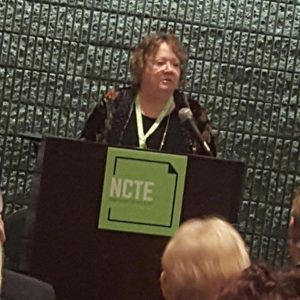
We then were lucky enough to see S.E. Hinton speak. She was the perfect mix of funny and insightful and thoughtful and blunt.
- “First half of my life people thought I was male; the second half they thought I was dead.”
- “No better writing teacher than Jane Austen and the library is free.”
- “I wrote The Outsiders because I was upset about the social situation at my high school.”
- “If you don’t write because you don’t know who is going to read/publish it, you’re not a writer. Focus on writing.”
- “I flunked reading/writing when I was writing The Outsiders.”
- “I used initials for first reviewers to keep bias out.”
- “Don’t think your enthusiasm doesn’t matter. Even if students may not like something, enthusiasm spreads.”
- “I couldn’t teach because couldn’t leave the kids at school. I would take them home with me & worry.”
- “Writing a screenplay is writing a coloring book where actors, directors, & others add color. Communal story telling.”
- “The Outsiders is what it is because of when I wrote it.”
On Sunday night with the ALAN cocktail party, the festivities officially began! The cocktail party is a free event for attendees of ALAN that give the authors and attendees time to mingle before the workshop begins on Monday. Thank you to the publishers who host the cocktail party!
Monday started with a bang! A.S. King was the key note speaker followed by Matt de la Peña. Both speakers blew away the audience with their truth about the state of our country, the importance of literature, and a focus on love.
A.S. King
- “I was often told to be more normal.”
- “I thank my 9th grade teacher for allowing me to write a 1st person narrative from the POV of a specific can of succotash.”
- “My characters’ voices are in my head and go out my fingers.”
- “I plan nothing. My process is based solely on trust in a very untrustworthy world.”
- “No matter what I do in life I’ll be doing it as a woman and that will piss some people off.”
- “Rejection letters taught me that woman are not supposed to be weird.”
- “Teachers know how to assess. You are in a contact state of assessment. You are teachers!”
- “People who make THE TEST are not even educators! Teachers’ jobs have grown more challenging.”
- “Relevant contemporary novels are not dangerous. No where as dangerous as thinking that all kids should learn the same.”
- “Failure is spectacular for risk takers! Risk takers are test proof.”
- “Innovation is the child of necessity.”
- “Classrooms are shelters for figurative tornadoes all around us.”
- “Education is being bought and sold while poverty is crushing the souls of our children.”
- “Write a common core of compassion and put it into every lesson.”
Matt de la Peña
- “Everyone has things they are proud of & wear on their sleeve & have things they are ashamed of. What makes us human.”
- “I want to go into schools where there is no one like me to show them there are people like me.”
- “Favorite thing about being home is reading books to my daughter.”
- He then read to us a story called LOVE which I cannot wait to see in completion form.
I must also mention what I felt was one of the most moving and powerful moments of the ALAN workshop: The Get Lit Poets. Four teens joined us and performed poetry for us that is incomparable to much I have heard before. Visit their YouTube channel to view their work.
One of the highlights on the Monday of the ALAN workshop is always the Walden Award presentation. This year’s award was given to All American Boys by Jason Reynolds and Brendan Kiely with the honors given to All the Bright Places by Jennifer Niven, Challenger Deep by Neal Shusterman, Out of Darkness by Ashley Hope Pérez, and Wolf by Wolf by Ryan Graudin. Chair Mark Lechter asked each author (all were able to attend but Jennifer Niven) to discuss the concept of hope.
Jason Reynolds
- “Hope is not self fulfilling.”
- “Just because you say you have hope doesn’t mean you do. It is not cerebral; it exists in the gut.”
- “Hope is thrown around so much, it doesn’t mean much any more. You have to do something.”
- “Students want to have these discussions, they just need somewhere to have them.”
- “Do something. Earn it. Every day.”
- “This book came out of their friendship. This is what it looks like. It can happen.”
Brendan Kiely
- “Tricky to talk about race and racism as a white person. But necessary.”
- “But it is incredibly important to think about our accountability to threatened communities.”
- “Hope is action.”
- “Identity politics are civil rights. Let’s go out there and BE hope.”
- “First need to deconstruct the part of me that is the problem so I can be part of the hope.”
- “Hope is the kind of road that I travel to find and share love.”
- “Love and love and love. I want to write in search of hope.”
Neal Shusterman
- “So many books about mental illness only show the dark side; this novel shows light.”
- “When you start to spiral, remember there is hope.”
Ashley Hope Pérez
- “Hope is not about happy endings. Not about naive optimism. Hope is about particular orientation to the future”
- “Hope depends on the reader, and the work the reader is willing to do.”
- “Hope in seeing the character’s resilience.”
- “Giving tiny seeds of hope for readers to go the future that we really want to have.”
Ryan Graudin
- “Hope is not an emotion. It is a force. It is the call to take action.”
- “We need something to keep us going. That is what hope is.”
My author panel was the last of the day Tuesday and was a wonderful exclamation point at the end of a workshop that many of us will never forget. My panel focused on re-imagining love stories with Kristin Elizabeth Clark, Kenneth Oppel, Bill Konigsberg, and Brendan Kiely. Each of their love stories is a deviation to the traditional, and we focused on that during the moderated discussion.
- “Love is love. It all feels the same on the inside.” -Kristin Elizabeth Clark
- “I wanted to celebrate rush of first love & make it more complicated than Romeo & Juliet.” -Kenneth Oppel
- “I’m always looking for the love story that hasn’t been written yet. | I’m exploring what youngest generation is doing with labels. I learn the most from them.” -Bill Konigsberg
- “The one purpose of life is to learn how to love & hold onto it. | It [Last True Love Story] is a dual love story; It is a journey of teens falling in love & end of life, holding onto love.” -Brendan Kiely
Mixed in with these panels and speakers were panel after panel and speaker after speaker of authors and educators and editors sharing their passion. Search #ALAN16 or @ALANorg on Twitter to view some of the amazing insights shared. Here are some more of my favorite quotes from both days:
- “The word diversity needs to be replaced with American.” and “Don’t hide behind the canon. We have robust literature that represents all teens now.” -Laurie Halse Anderson (while wearing her GOT CONSENT? t-shirt)
- “Urban fiction is a label to say the book is a little bit dangerous. We need to be self aware that the label Urban sweeps cultures under the rug. Erases identity. Using the term URBAN FICTION is simplifying things. And anything easy should be thought about.” -Jason Reynolds
- “Whatever the setting it, it is vitally important to humanize every single character on the page.” -Ibi Zoboi
- “Soon the only thing mentioned on vocab tests and in schools about American Indians will be the term extinct.” -Tim Tingle
- “There are many of us [Native Americans]. We write nation specific. We all have diff cultures. What we have in common is genocide.” -Eric Gansworth
- “Challenge of writing Vincent Van Gogh’s life was figuring out how reliable he was as a narrator” -Deborah Heiligman
- “Writing fiction is like baking a cake with best ingredients from store; nonfiction like baking with what your partner brings home.” -Candace Fleming
- “Humans are good that way. If you love something hard enough, it rubs off onto others.” -Maggie Stiefvater
- “I like young people to understand that adults are just people. They are flawed. | Risks aren’t in the situations; it is in creating characters who are real. Writing a kid who’s an amazing human being, a character who is real, beautiful, absolutely sincere, is the risk. ” -Benjamin Alire Saenz
- “Cave paintings show creativity is as important to the human necessity as food & air. Creativity is an elemental human trait.” -Jeff Zentner
- “Art brings together people. And gives us a world point of view.” -Kayla Cagan
- “Women’s stories disappear, and it can be hard to rebel. Better to see a female fight and lose than never fight at all. Every girl deserves a hero of their own. | Fiction and stories have shaped human existence.” -Frances Hardinge
- “It’d be a shame to not swim in the sea of stories.” Peadar O’Guilin
- “Not all art is going to be seen as beautiful by all.” -Rahul Kanakia
- “There are no limits to what books are suppose to be.” -Randi Pink
- “I want readers to be enraged, to empathize with characters & advocate anywhere they see injustice.” -Patricia Powell
- “There is a difference between failing and being a failure.” -David Arnold
Noah Schaffer kindly took so many photos while attending the ALAN workshop, and he has shared them publicly with us on Facebook. Join the ALAN Public Group to view them (and LIKE our ALAN Page (https://www.facebook.com/alanorganization/) while you are on there!).
Like NCTE, ALAN allows me to see many authors that I love!
A.S. King
Jason Reynolds
Jon Sciezska
Candace Fleming
Maggie Stiefvater
Benjamin Alire Saenz
Peadar O’Guilin
Ryan Graudin
Brendan Kiely
And Trent visited! Trent with:
Brendan Kiely
Kenneth Oppel
Bill Konigsberg
Kristin Elizabeth Clark
Neal Shusterman
Probably my favorite part of the two days though are my time with my friends who truly support and push me as the educator I am and hope to become. I am always terrible about getting photos of everyone (including one with Ricki!), but here are the ones I took.
With Michele Knott and Jennie Smith
Trent with:
Cathy Blackler
Jennie Smith
Jen Ansbach
Katie Halata
Until next year, friends! Will I see you there?
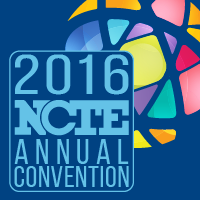
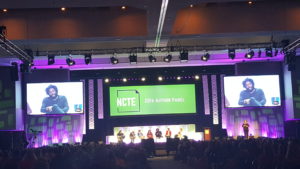
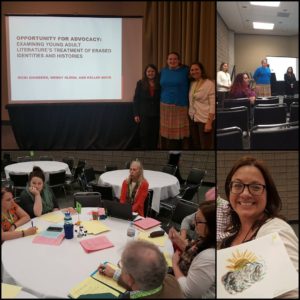
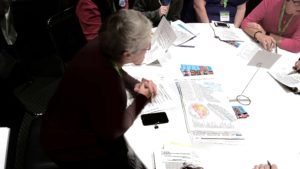
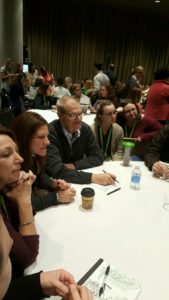
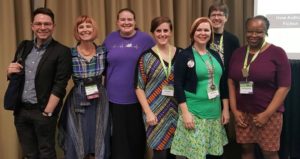
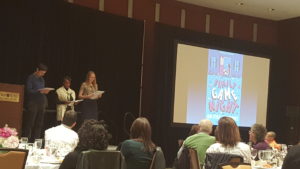
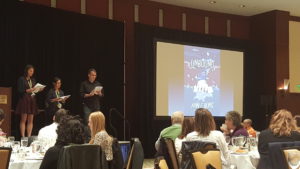
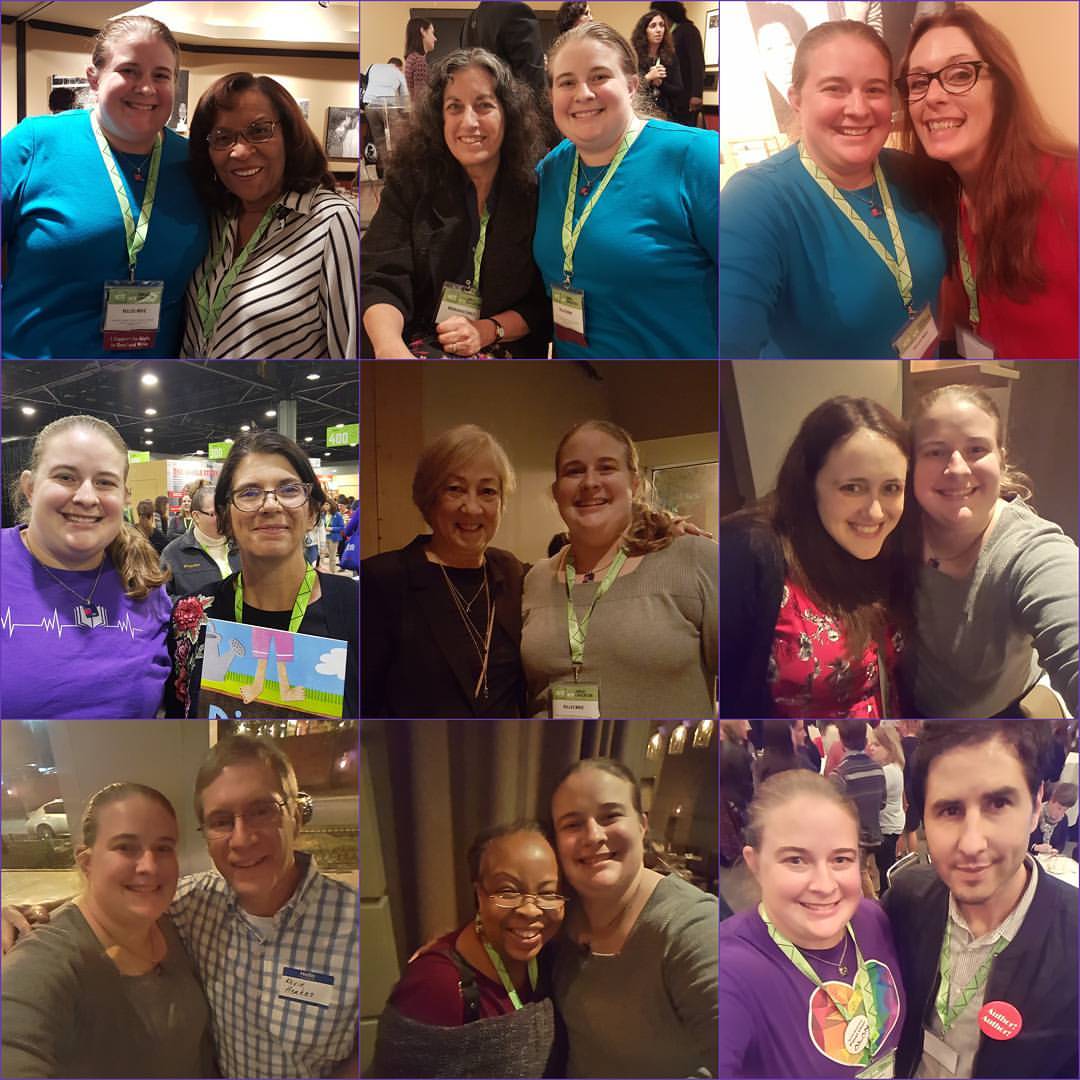
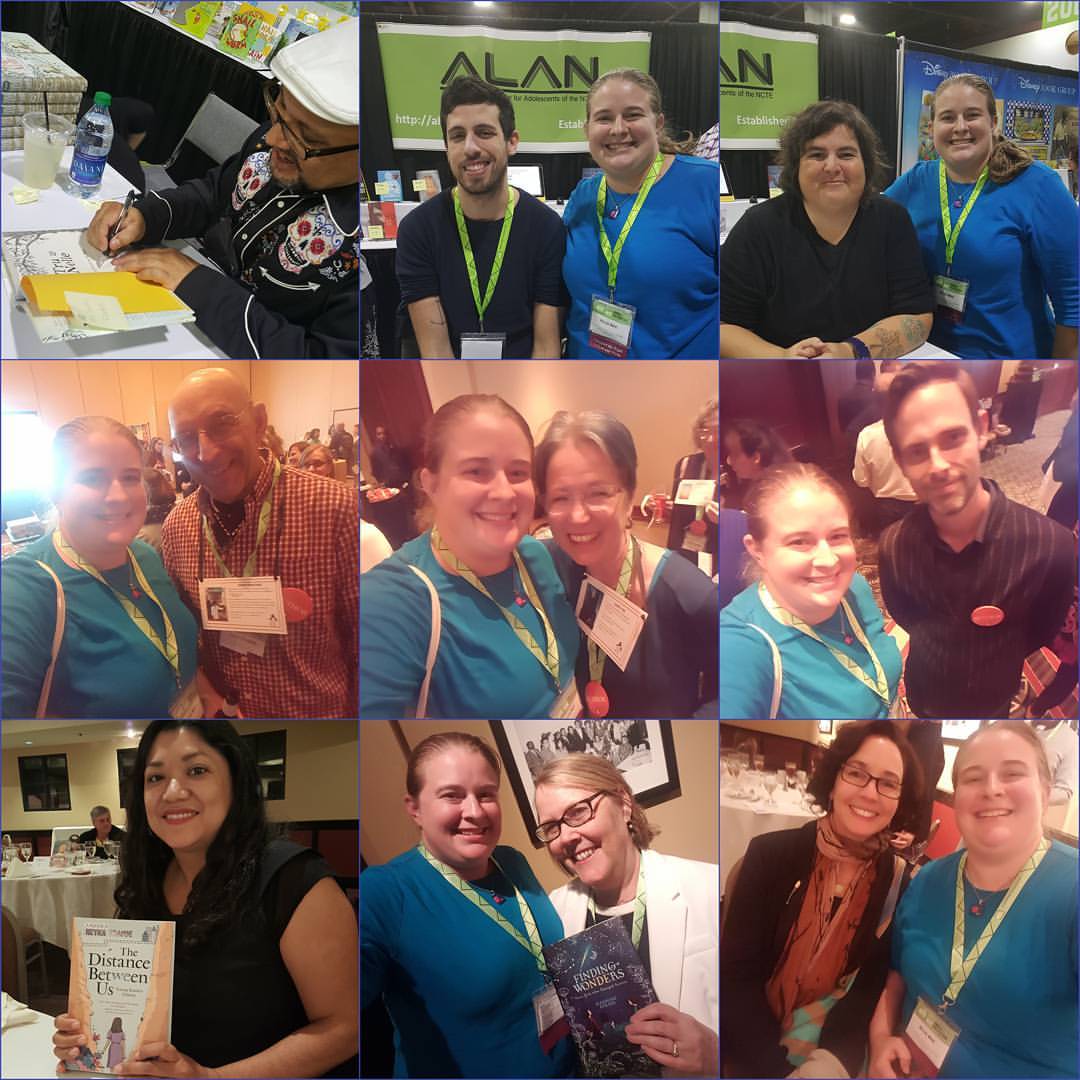
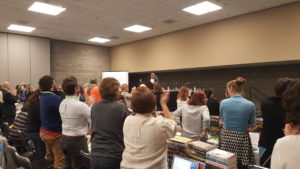
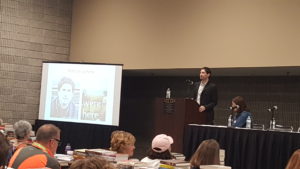
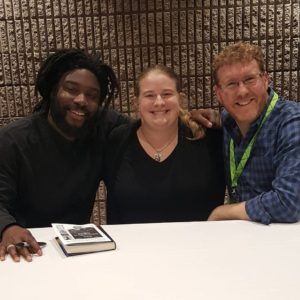
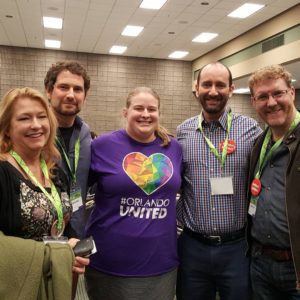
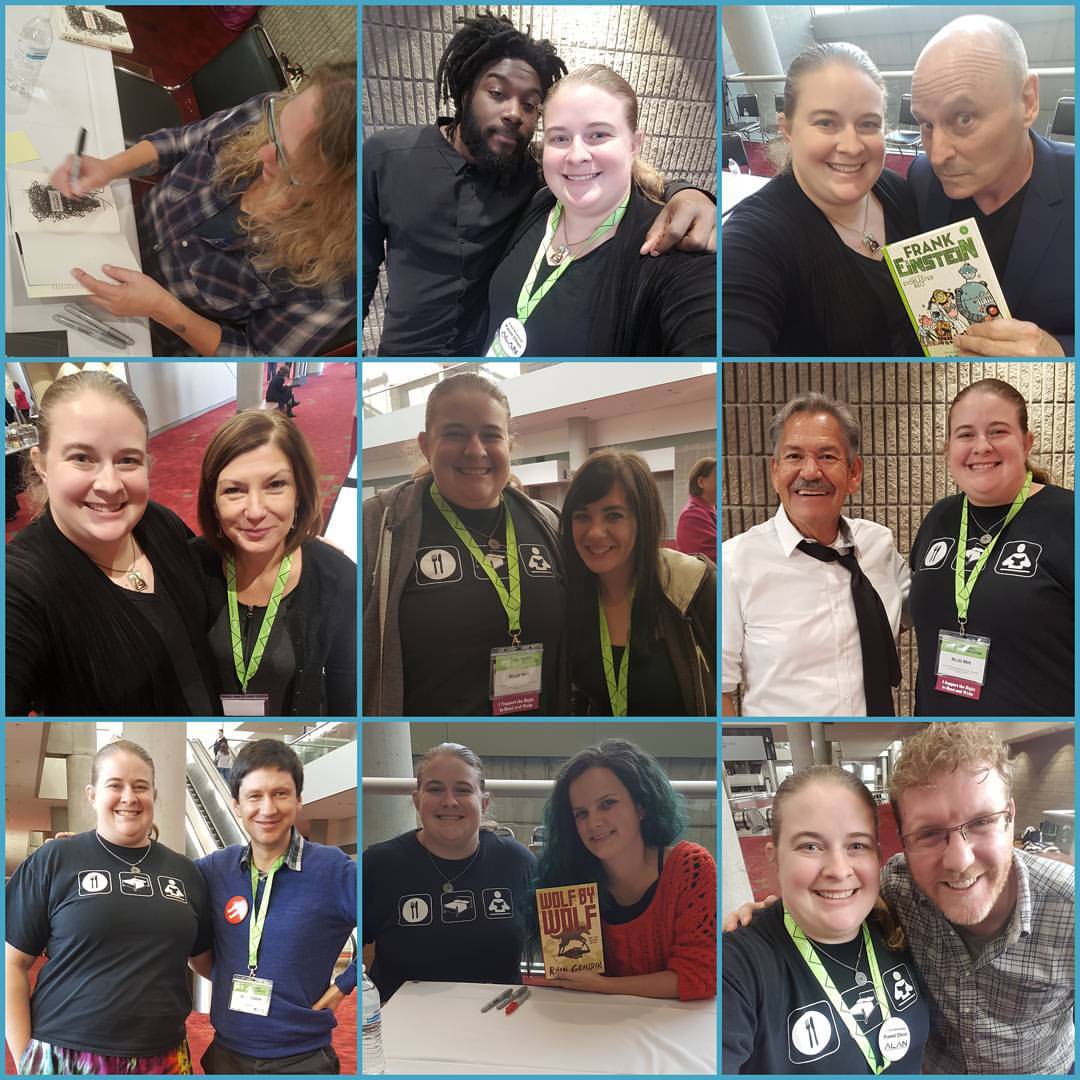
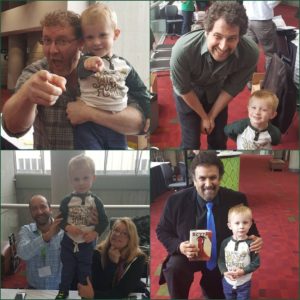
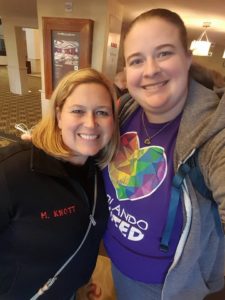
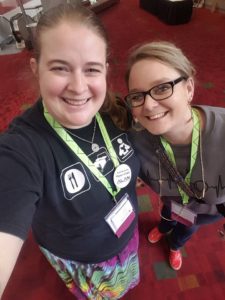
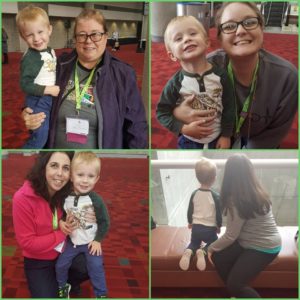


Such an inspiring set of quotes! Thanks for sharing with those of us who weren’t there.
Loved reading about all the workshops I MISSED at NCTE.
Next best thing to being there though. (You can’t be everywhere at once, right?)